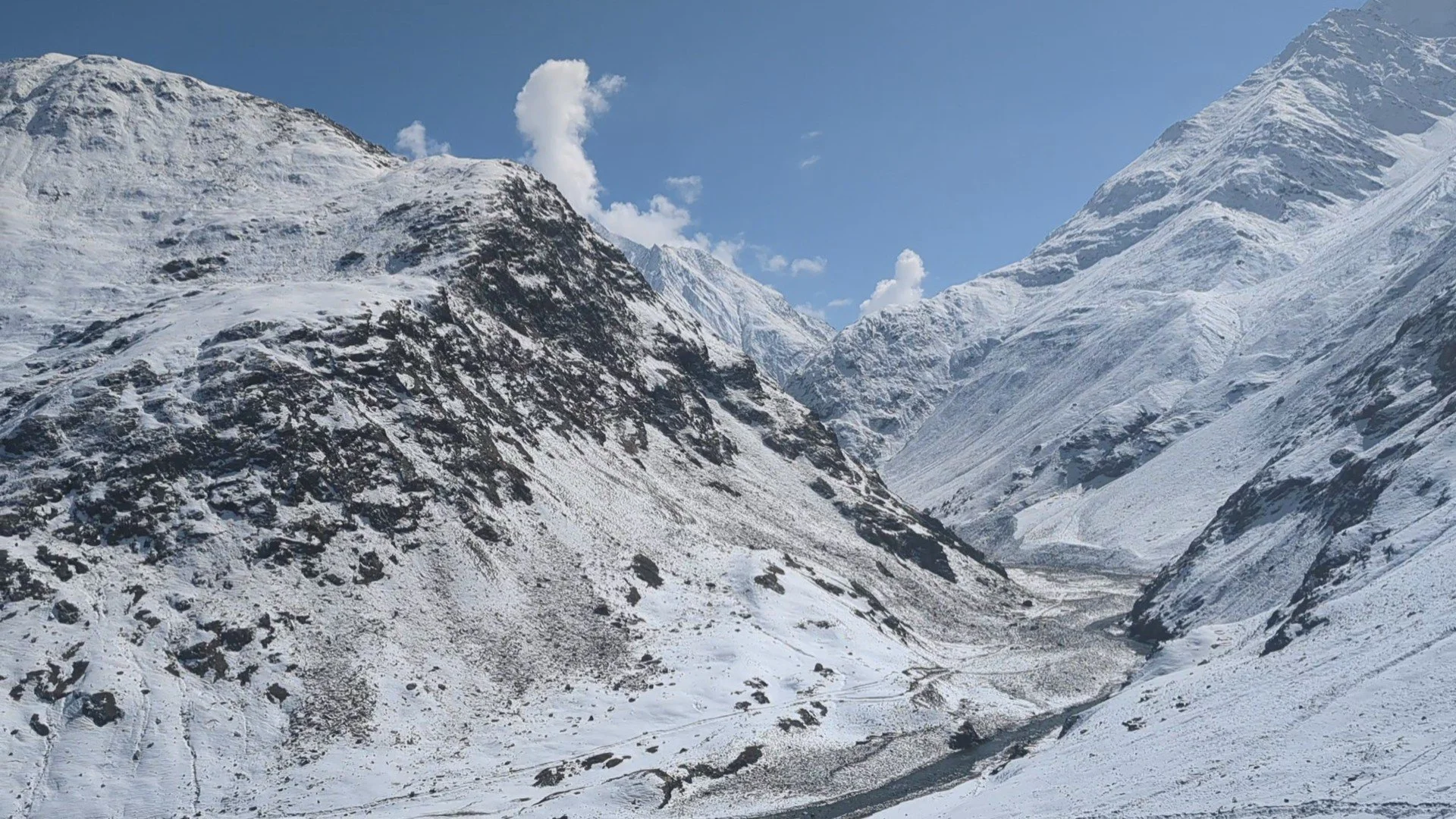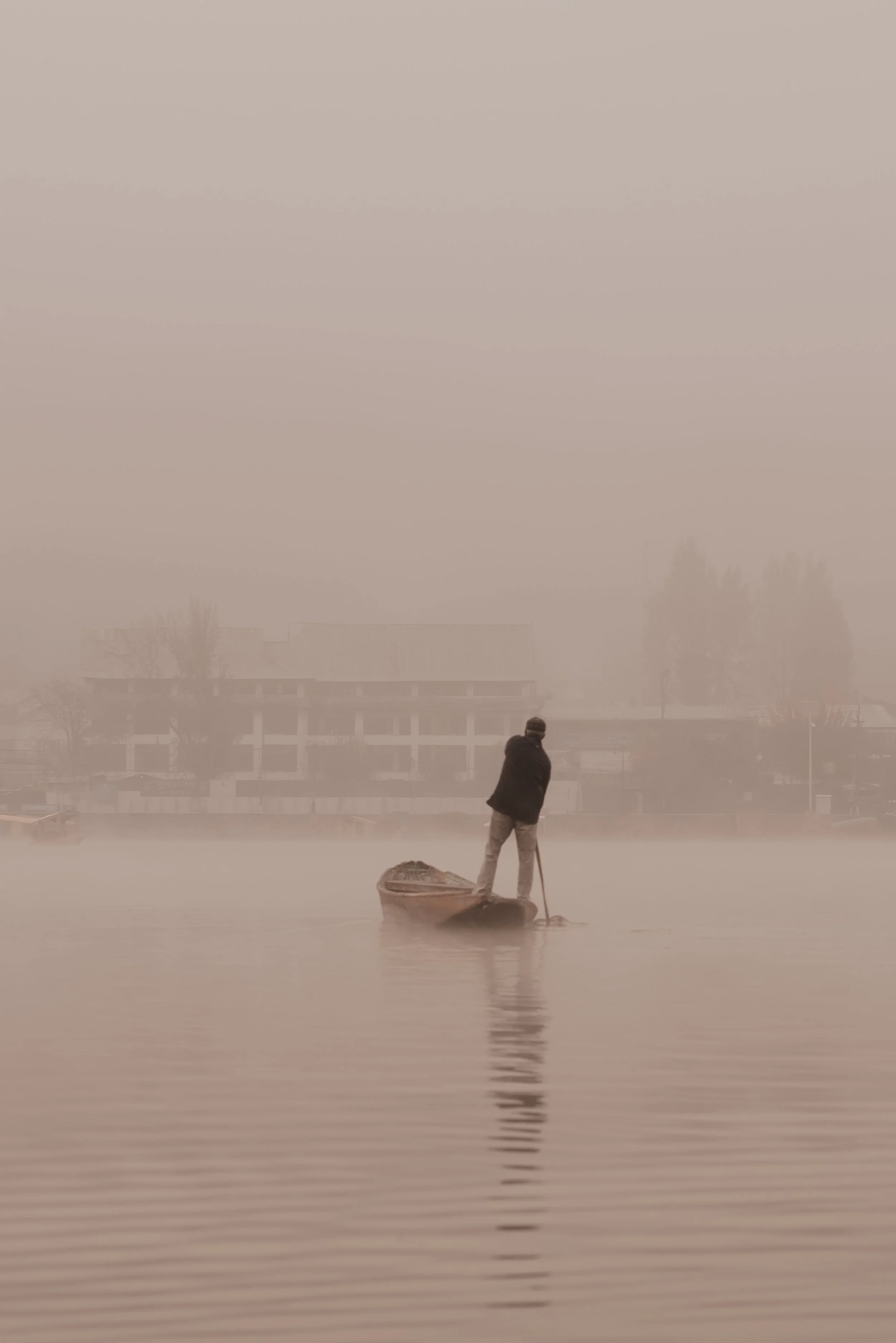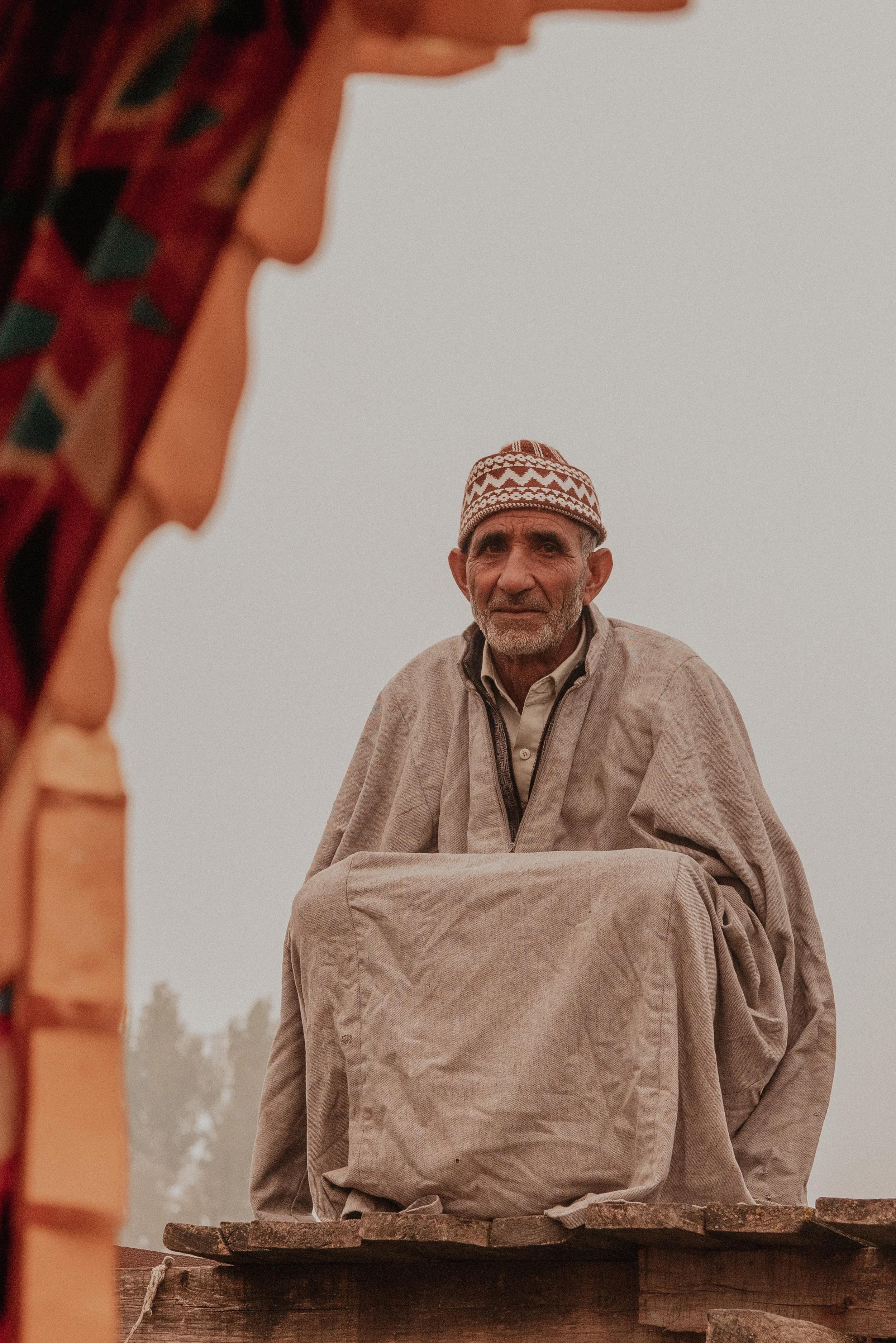The dawn call to prayer sounded off in a haunting melange of voices over the air, reaching us from all directions as we shivered our way across Dal Lake in the Golden Rose. Rashid was hacking and coughing from the back of his shikara, paddling us furiously through this dense fog in a pre-dawn light, the rows of the characteristic houseboats of Srinagar barely visible to either side of us. Jon was all stories: “This one geezer offered to take me out on his shikara for a full day on the lake, and to see some ancient tree for a ‘very good price,’ he insisted. But each time I asked him what the actual price was, he would evade the question, just saying ‘verrrry low price, sir’. I think I asked him seventeen bloody times how much he would charge before he finally gave in, and said it would be four and a half GRAND!” Jonas had recent developments of his own to report: finding this backstreet, discreet bar where drunk patrons were slugging each other left and right, in a proper brawl. And also that on at least two occasions, local men had caught him in his attempts to sneak candid photos of their wives in passing on the streets. They confronted him in an uproar, demanding that he delete all unsolicited photos from his phone as they watched.
Shikara guides on Dal Lake, Srinagar.
I had met my companions by chance circumstance (Jon from Britain, and Jonas from Germany) on an overnight bus from Leh to Srinagar. We became friends as our 16-hour bus ride almost doubled in duration, when pass closures beyond the town of Kargil forced our driver to stop late at night in a small roadside town to wait for the pass to reopen. There were two guest houses on the road available to us, but like most of the passengers, I decided to just sleep in my seat, passing a miserable night shivering as the temperature outside the window next to me dropped below freezing. This halt was at 10 pm, and our bus didn’t get started again until almost thirteen hours later. So I got to bond with Jon and Jonas during this holding period. Stranded in the middle of nowhere, unsure of how many hours or days the rest of this journey to Kashmir would take. The beautiful reality though, was even though the delay was an inconvenience, it meant that we got to experience the stunning views of the pass crossing during full daylight, as opposed to in complete darkness, and resulted in quite possibly the most stunning bus ride I’ve taken to date. We got to see the complete transition of territory: trading the dry, barren, rust-colored mountains of Ladakh, for the lush, green mountains of Kashmir reminiscent of the Swiss Alps. Traveling slowly is truly the best way to travel in India. Not worrying about your arrival time, truly seeing the country pass by you, with a real opportunity to connect with the other travelers around you, as opposed to paying way more for the pressurized, sanitized cabin that is more isolating than any other form of travel. Plus, if you plan on following a strict schedule in India, the more likely it is that things are not going to go as you intend, it’s just the way of the land here.
Mountain pass views from the bus window. Somewhere in the vicinity of 15,000 feet.
The floating vegetable market of Dal Lake
The sun never seemed to actually rise and cut through the weighty fog (likely smog). It was as if we were floating through a misty, cold separate world. Soon we reached our destination, a floating vegetable market, vendors selling their wares on shikaras in a secluded part of the lake, where all business would be concluded by 8 am. The first vendor to float up to us was selling kahwa, the traditional Kashmiri tea, which was my favorite of any variety I had yet had in India. He charged a steep 100 rupees per cup, a little over a dollar, though understandable given its service taking place just centimeters above the surface of a lake. He served it with diced almonds, honey, and rose pedals. As we sipped our kahwa, we were soon accosted by a flower and seed salesman. We declined politely, after which he began to urgently push his Lotus seeds upon us. After dismissing him, our boat was shimmied up to by a jewelry salesman, who upon my admission that I couldn’t afford such nice things, he admitted that these were conveniently all replicas anyway, but assured us they were of the “highest quality.” We convinced him that we had no interest, and he disengaged our boat with only a look of disgust. The hat and glove vendor was very kind and helpful, and not too overly pushy. Jonas kept refusing him politely, “Sorry, I already have four hats, it’s too much. Would you like mine?” pointing to his head, persuasive in his thick, German accent. Jon would always deflect and just ask them if they instead had a pack of cigarettes for sale, but the vendors would only have a single smoke on offer, if anything, much to Jon’s dismay. I remarked that if there wasn’t a ciggy shikara to be found in this mess, then someone was missing out on a prime business opportunity. “Seeds or ciggies? The answer is obvious.”
It seemed that there were in fact no vegetables being sold on this floating market, that either it wasn’t the authentic vegetable market (which seemed feasible, seeing as how the day before I had paid an auto-rickshaw driver to take me to a famous mosque across town, and he dropped me at one that was conveniently only a third of the distance, knowing I wouldn’t be able to tell the difference.), or that it was just a ploy for vendors to push their wares on tourists that were now conveniently trapped on these small skiffs in the middle of a lake. We were the worst kinds of prospects to be on the lake, from the viewpoint of those men, who soon began to flock to the several shikaras carrying Indian tourists, who were a much easier sell than dirtbag budget travelers such as ourselves. It was a relaxing experience after we became silently blacklisted; no eager salesman dared row up to our boat with the intent of rowing away a little bit richer; and we had Rashid to deftly maneuver us around the lake so we could get a better angle for photos. Jon finally acquired his elusive smokes, at this shady-looking shop in the shadows on the shore of the lake. He dubbed it the “coolest little shop on Earth.”
Jon’s favorite shop
On the misty float back to solid ground, we reflected on some of our favorite places to travel. Jon firmly believed that some places pulled on one’s heart more than others because of time spent at these places in past lives. In his example, he attributes that to his fascination with China, revealing that he couldn’t help but cry the first time he trod through the Forbidden Palace, nor could he explain why. Jonas shared that Pakistan was his favorite country to travel, due to its unspoiled natural beauty and the authenticity of its people; he had been three times. And I shared my feelings about Nepal; a country I have spent four months in between two visits, though one that I am still constantly thinking about returning back to. What was interesting was that each of our favorite countries pretty much converged here, in the Himalayas. For me, the most difficult and distressing part of visiting Kashmir was observing the state of occupation by the Indian military over the predominantly Muslim population. I stayed at a home of a Muslim family, who welcomed me warmly despite my late, unannounced arrival, offering me a cup of kahwa in the privacy of their living room. One of the elder men then explained to me the situation of life for Muslims in Kashmir, describing a lack of autonomy that began when the independent kingdom of Kashmir was annexed and divided between India and Pakistan against the will of the people. In recent years, they suffered through a complete lockdown of the region for six months by the Indian government in 2019, and even today, witnessing an unending cycle of media propaganda regarding terrorism and Islamic extremism. I had long known that the US State Department webpage bore a “Level 4” warning for the region: “Terrorist attacks and violent civil unrest are possible in the union territory of Jammu and Kashmir. Avoid all travel to this state. Sporadic violence occurs particularly along the Line of Control (LOC) separating India and Pakistan, and in tourist destinations in the Kashmir Valley: Srinagar, Gulmarg, and Pahalgam.” Indian acquaintances had specifically warned me to “be safe” and take extra care in Kashmir. But when I went, all I saw was a peaceful and repressed population, living under the eyes of the Indian military. Soldiers with automatic rifles were stationed almost everywhere, and I was sickened when I went to photograph a bazaar recommended by Jonas, and saw troops standing on abandoned rooftops, overlooking the crowds while armed with automatic rifles. I didn’t even want to bring my camera to my eyes, out of fear that I would be targeted and questioned. But now I wish that I hadn’t been paralyzed by that fear, and had an image to relay to whoever reads this.
Smog on Dal Lake. Srinagar, Kashmir
The city had finally woken up, but the sun still wouldn’t break through the smog. Still cold from our morning shikara ride, we found a mobile roadside tea joint, where locals were converging for breakfast. 40 rupees (about fifty cents) for a cup of chai and a few pieces of bread pakora (sliced bread fried in batter, like the Indian equivalent of French toast). We finally found warmth as we stood sipping chai out of our paper Nescafe cups, munching on the pakora, (Jonas went back for three more helpings). At one point, a short local man came up to Jon and started talking to him as if he knew him. Jon let out a guffaw, and gestured his thumb toward the man beside him. He looked at us in stunned disbelief as he explained, “This here is that GEEZER who tried to take me to that old tree for FOUR GRAND!”
If you enjoyed what you just read, please consider subscribing to the email list, for updates on new writing. Thanks for reading, M.
- Gurgaon, India 11/10/22
Local observer of the morning vegetable market
city of Srinagar. Shot on 35mm Ilford black and white film
The village we were stranded in on the drive to Srinagar - Shot on 35mm Ilford black and white film
Shot on 35mm Ilford black and white film
Srinagar, the white temple - Shot on 35mm Ilford black and white film
Moghul Gardens, Srinagar - Shot on 35mm Ilford black and white film











